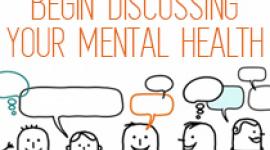The Solution to Your Problems Isn’t About the Problem
Here's what's happening on the HealthyPlace site this week:
- The Solution to Your Problems Isn’t About the Problem
- New, Free Bipolar eBook from HealthyPlace
- From the HealthyPlace Mental Health Blogs
- Video: What is Bipolar 2? For Real!
- Most Popular HealthyPlace Articles Shared by Facebook Fans
- Mental Health Quote

The Solution to Your Problems Isn’t About the Problem
If someone were to ask you what you’d like to rid from your life, chances are the answer would come easily. Mental illness. Mental health struggles. Certain stressors. Horrible relationships. We tend to be good at identifying what we don’t want. But the follow-up question is sometimes harder: What do you want in your life? As solution-focused therapy asks, what will be different when the problem is gone? What will be in its place?
Many times, we’re so focused on the problem that we don’t think about the solution. The ability to move yourself forward, though, is less about the problem and more about your actions in planning and implementing a solution.
This process of moving toward what you want (instead of away from what you don’t) often begins with self-discovery. Who are you at your core? Get in touch with yourself to discover who you really are and what you want in life. Some ways to do that:
- Journal about yourself and your inner and outer experiences
- Read books, visit museums, attend lectures, etc. You can hone your sense of fun while discovering your interests
- Volunteer in various places to discover your strengths and talents
Initially, your struggles may persist. Do small things anyway, and you’ll see that working toward what you want is a wonderful process.
Related Articles Dealing with Solutions, Moving Forward
- Five Solution-Focused Ways to Beat Anxiety
- Journaling for Mental Health Benefits
- The Importance of Acknowledging Mental Health Recovery Progress
- What is Self-Help For Mental Health?
- Best Self-Help When Living with a Mental Illness
Your Thoughts
Today's Question: Which of your mental health struggles is the hardest to find a solution for? We invite you to participate by sharing your thoughts, experiences, and knowledge on the HealthyPlace Facebook page and on the HealthyPlace Google+ page.
-----------------------------------------------------------------
New, Free Bipolar eBook from HealthyPlace
We are proud to launch our new bipolar eBook: Introductory Guide to Bipolar Disorder. If you or a family member have bipolar disorder, you’ll find this free eBook extremely helpful. It’s twenty pages of clear, concise information on everything from the different types of bipolar disorder to symptoms and treatments, along with how to live with bipolar disorder and deal with the risk of suicide.
The beauty of this eBook is that the information you need is all in one place. You don’t have to scour the internet looking for it. And because it’s downloadable, you can refer to it whenever you want.
By the way, if you find the eBook useful, I hope you’ll share our page link on your blog, website or social media. Hopefully, it will help others too.
From the HealthyPlace Mental Health Blogs
On all our blogs, your comments and observations are welcomed.
- Bipolar Disorder and Romanticizing Things
- What to Expect From Your First TMS Treatment for Depression
- 3 Myths About Parenting a Child With Mental Illness
- Smartphones and Mental Health: Less Screen Time, More Bliss
- Emotional Flashbacks in Complex PTSD
- Should You Expect Less From People?
- 9 Things to Add to a Ritual to Reduce Anxiety
- Anxiety and Bipolar: What It's Like to Have Both?
- 3 Tips to Improve Your Conflict Resolution Skills
- Is My Anxiety Caused By Motherhood or Mental Illness?
- Learning Communication Skills Is Important to End Self-Harm
- Practicing Mindfulness After a Meal in Eating Disorder Recovery
- When You're Anxious, Don't Give Up
- 3 Ways Perfectionism Can Lead to Low Self-Esteem
Feel free to share your thoughts and comments at the bottom of any blog post. And visit the mental health blogs homepage for the latest posts.
------------------------------------------------------------------
From HealthyPlace YouTube Channel
I'm Hannah. I Have Bipolar 2
We have the textbook definitions of bipolar 2 online, which are helpful but can be hard to relate to. That’s why, in this video, I share what bipolar 2 disorder means to me based on my experience and how it makes me feel on a daily basis. (Watch Hannah and subscribe to the HealthyPlace YouTube channel for more great mental health videos.)
------------------------------------------------------------------
Most Popular HealthyPlace Articles Shared by Facebook Fans
Here are the top 3 mental health articles HealthyPlace Facebook fans are recommending you read:
- I Binged. Now What Do I Do?
- What Borderline Personality Disorder Feels Like Inside
- I Hear Voices with My DID But I'm Not Always Honest About It
If you're not already, I hope you'll join us/like us on Facebook too. There are a lot of wonderful, supportive people there.
------------------------------------------------------------------
Mental Health Quote
"A woman can’t change a man because she loves him, a man changes himself because he loves her."
Read more abuse quotes.
------------------------------------------------------------------
That's it for now. If you know of anyone who can benefit from this newsletter or the HealthyPlace.com site, I hope you'll pass this onto them. You can also share the newsletter on any social network (like facebook, stumbleupon, or google+) you belong to by clicking the links below. For updates throughout the week, circle HealthyPlace on Google+, follow HealthyPlace on Twitter or become a fan of HealthyPlace on Facebook. Also, check out HealthyPlace on Pinterest and share your mental health pins on our Share Your Mental Health Experiences board.
APA Reference
Peterson, T.
(2018, October 22). The Solution to Your Problems Isn’t About the Problem, HealthyPlace. Retrieved
on 2025, April 19 from https://www.healthyplace.com/other-info/mental-health-newsletter/the-solution-to-your-problems-isnt-about-the-problem



